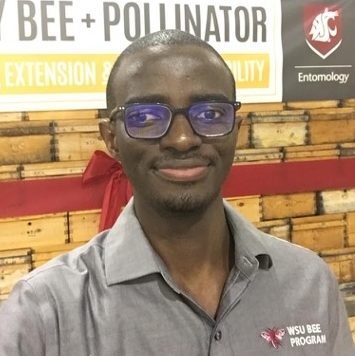Once a month we sit down with an Entomology graduate student to get to know more about them, how they became interested in Entomology, and what their research is about. This month, we sat down with Stephen Onayemi!

Q: Masters or Ph.D., and how far into your program are you?
A: I am in the second year of my master’s program.
Q: What is your research project?
A: My research project is on the effect of increased CO2 on varroa mites on honey bee colonies in indoor storage. I am looking at a non-chemical approach to controlling varroa mites in honey bee colonies. Honey bees produce high CO2 in their colonies. So, I am looking at how the accumulation of CO2 in honey bee colonies in indoor storage can control varroa mites.
Q: How did you become interested in entomology?
A: My interest in entomology started during the practicum year of my undergraduate studies in Crop Production and Protection. At the research farm of Obafemi Awolowo University (Nigeria). On the research farm, crops such as watermelon, yam, cassava, corn, plantain, cocoa, carrot, and lettuce were planted. I worked in several agricultural units, including the bee research facility and the crop production unit. Several tons of harvest crops were lost, mostly from pest infestation.
Having witnessed both bees and the pests’ roles, I became passionate about tapping into beneficial insects’ useful functions and looking for solutions to insects’ negative consequences on crops. I specialized in Entomology in my senior year. Thus, my capstone project focused on minimizing flea beetles’ infestation on okra (a staple crop) using cultural control methods. I developed a new intercropping okra technique with kenaf (a tropical fiber crop) to minimize flea beetle infestation. This strategy builds on subsistence farmers’ intercropping practice to address the non-pesticide management of flea beetles. Intercropping helps reduce their cultivation costs to the minimum and avoid excessive dependency on synthetic agrochemicals.


Q: Why would you recommend entomology as a career?
A: I recommend entomology as a career because of the several opportunities in academia, federal or state government, industry, and the business world. Entomologists are lifesavers. I see entomologists rescuing the world from hunger through food sustainability and the preservation of agriculture.
Q: What are your future career plans after graduation?
A: I plan to pursue a Ph.D. in Entomology. I am open to many options after that.
Q: What is your favorite insect and why?
A: Honey bees. The organization and eusociality of the honey bees are quite impressive and exciting.
Visit the WSU Honey Bees & Pollinators website here at bees.wsu.edu or check out his Twitter @StephenOnayemi!